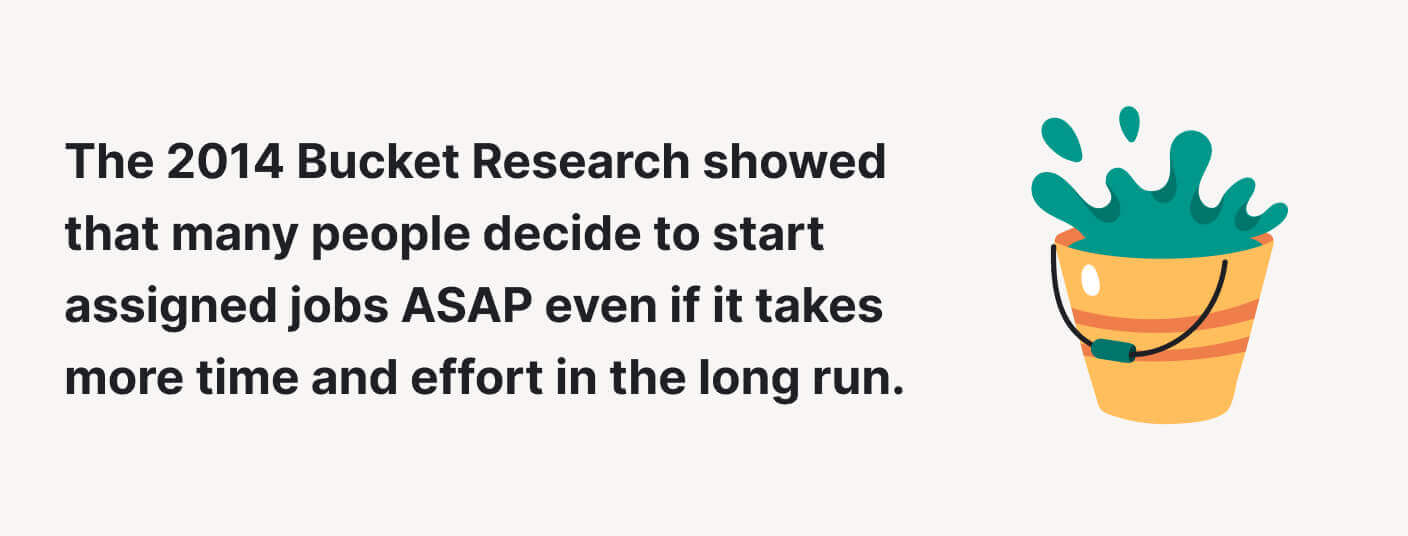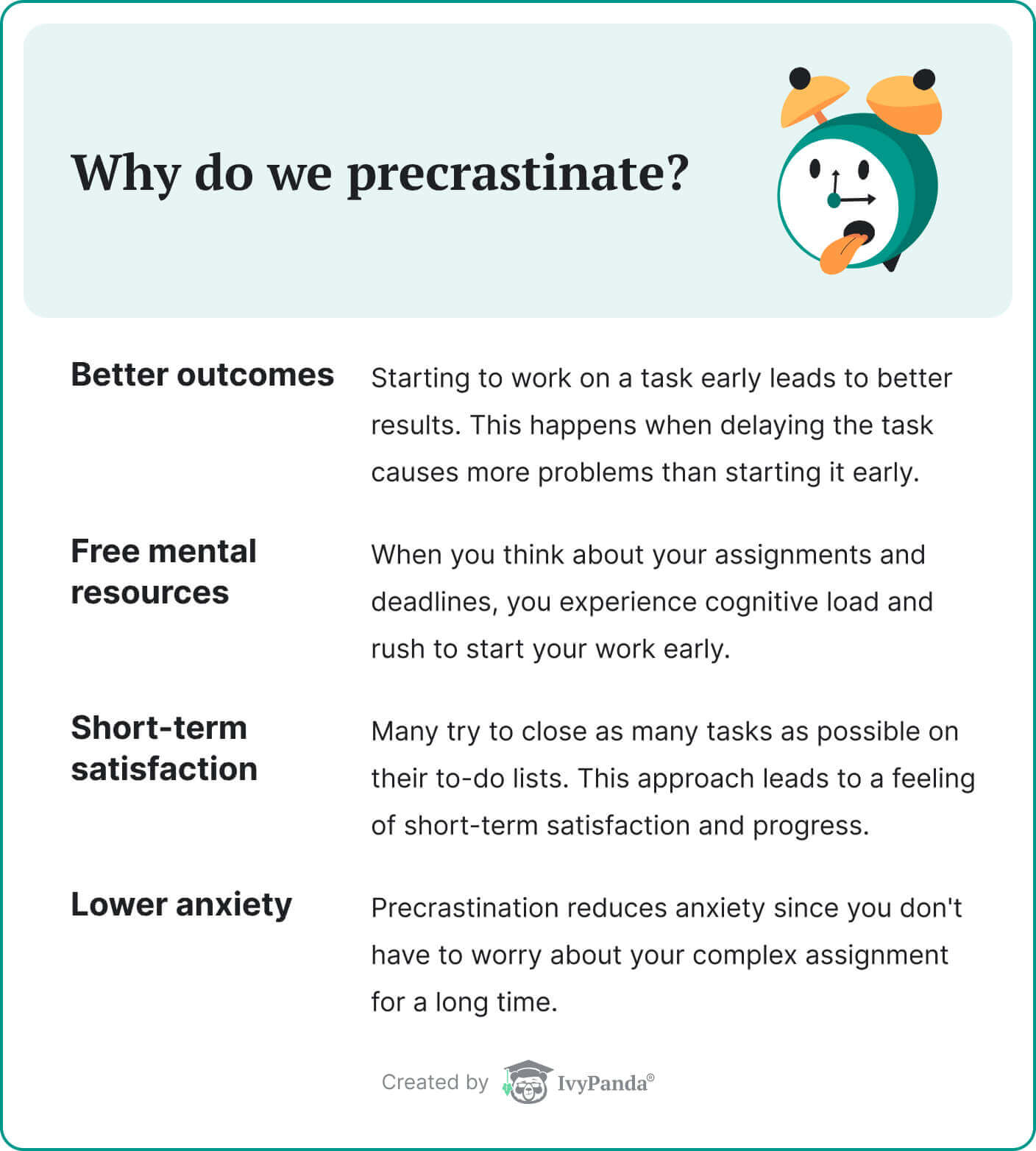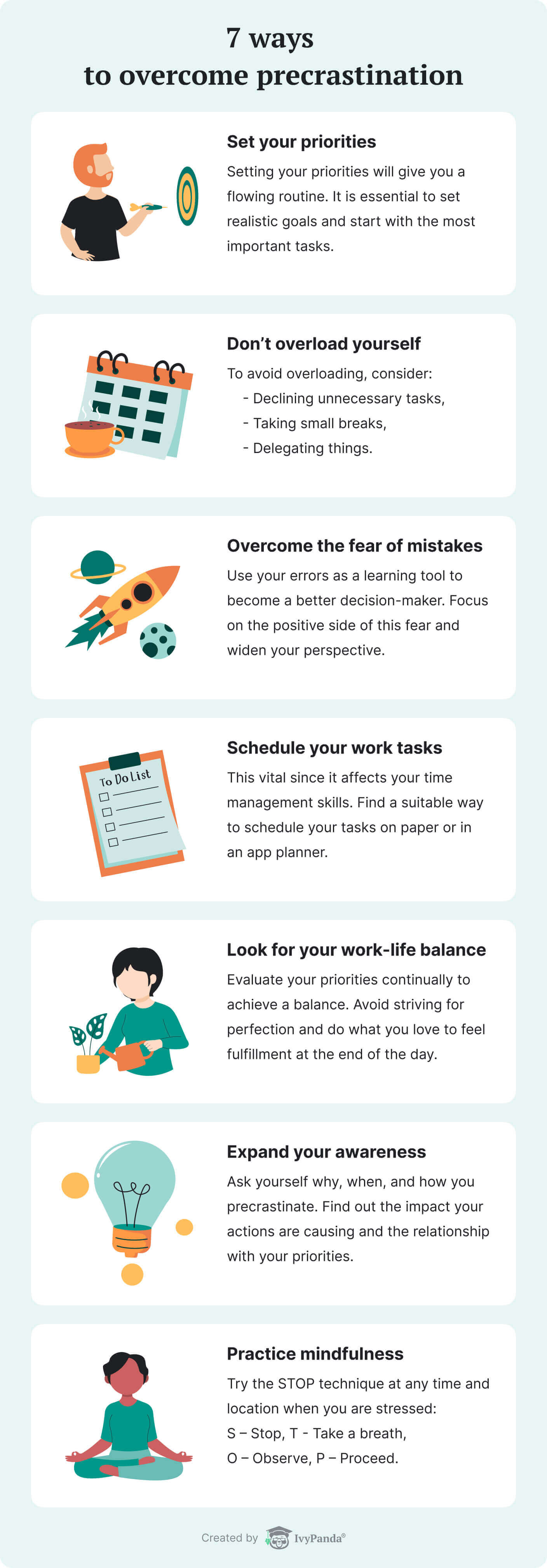Have you finally beaten procrastination? Have you stopped doing compulsive cleaning instead of exam preparation? Do you answer your professor’s emails immediately, even if you are at the bar with friends? Congratulations, you’re in the precrastination trap!

Why is precrastination a big deal?
Although it’s sometimes considered as the opposite of procrastination, it can also interrupt your work-life balance, just like the habit of postponing tasks until the last moment. Precrastination often results in negative outcomes and might compromise your academic achievements as a student.
Read on to find out more about precrastination and learn effective tips to overcome it.
🐝 Defining Precrastination
What is precrastination?
Precrastination, also written as pre-crastination, is the compulsion to complete tasks quickly, even if the outcome is inefficient or has long-term costs.
This occurs when a person rushes to work on an assignment without having all information needed for its proper planning and execution. Thus, they end up putting in extra effort and doing a poor job.
Let’s explore examples of precrastination to help you understand the concept better:
One case is when a learner rushes to complete an assignment or turns in a paper as soon as the teacher assigns the work. The student begins the assignment without planning, researching, or editing, and ends up with a poor grade despite the effort and time they invested in the process. A student who frequently repeats this action is called a precrastinator.
Another example is reading your emails first thing in the morning after getting to the office instead of settling in and prioritizing your schedule. Do you check your smartphone every time an alert pops up rather than reserving a time slot in your working schedule to read all your messages together? These are also instances of precrastination that distract you from core tasks and worsen your productivity.
In addition, you might interrupt someone during a conversation instead of waiting for your turn to respond. Precrastination also happens when you launch a product in the market without testing if it will function first.
The Bucket Research
According to the 2014 Bucket research by David Rosenbaum and colleagues at Pennsylvania State University, many people decide to start assigned jobs as soon as possible to get them off their to-do list, even if it takes more time and effort in the long run.

The researchers placed two buckets at different locations – one was at the start of an alley, while the other one was placed closer to its end. The participants were then instructed to choose one bucket and carry it to the end of the alley. During the experiment, most participants picked the bucket closer to them, which meant carrying a bucket for a longer distance and applying more physical effort.
But the bucket that was placed farther away was usually not chosen by the participants, even though picking it involved less effort to carry it for a shorter distance.
Therefore, the results showed that many study participants tend to procrastinate, picking a bucket closer to them in an effort to start the task as soon as possible.
The participants were less concerned about the physical effort and distance they would need to carry the bucket to the drop-off point because starting the task earlier subconsciously meant ending the task earlier (although that was not the case). Rosenbaum’s research formed the basis of the term precrastination.
🤔 Is Precrastination a Big Deal?
Precrastination might give people short-term satisfaction because of a sense of progress. However, as a result, there is no time to think deeply about the task and the execution process. Rushing to complete the task might have repercussions due to distractions and a lack of focus.
When precrastinating, you experience higher anxiety levels because you want to make progress quickly. This urge causes you to jump straight to the task without giving yourself time to plan and analyze. Ultimately, you will make bad decisions, lower your efficiency, and have a worse outcome.
Conversely, precrastination may have benefits like freeing up mental resources and giving short-term fulfillment. But despite these perks, it results in the poor prioritization of tasks and negative results in most cases.
⏰ Why Do We Precrastinate?
If precrastination has potential dangers, then why do people do it? There are reasons behind rushing to complete tasks quickly.

Let us explore the potential causes of precrastination.
🆚 Is Pre-crastination Really the Opposite of Procrastination?
What is the opposite of procrastination? Is precrastination really the opposite of procrastination?
Procrastination is a well-researched phenomenon that entails postponing tasks and rushing to complete them very close to the deadline. In contrast, precrastination is a recent discovery that entails completing tasks too early. Thus, precrastination can be considered the opposite of procrastination.
However, recent studies suggest that precrastination is much more than the opposite of procrastination and has a deeper connection to people’s primary personality traits.
Procrastination Vs. Precrastination
- Both precrastination and procrastination are linked to conscientiousness, but in the opposite way. Conscientiousness is a personality trait of organized and focused people. In a nutshell, a more conscientious individual has a higher chance of precrastinating, while a less conscientious one will procrastinate.
- Another difference is that precrastination is not connected to impulsivity, while procrastination is typical among impulsive individuals.
- Moreover, procrastination has a long history since the term has been used since the 1500s, while precrastination is a new term that has been studied for less than ten years.
Still, regardless of their differences, both actions are considered maladaptive since they result in negative outcomes. That said, precrastination may also be regarded as a form of procrastination.
🛀 7 Ways to Overcome Precrastination
The first step to overcoming precrastination is to become aware of why, how, and when you precrastinate.
Once you figure out the reasons for this behavior and follow the approach below, you will stop rushing to complete your tasks too early.

1. Set Your Priorities
Getting your priorities straight often results in proper organization and helps you to develop a flowing routine. It is essential to set realistic goals that you are likely to attain, hence ensuring productivity and overall success. You should also place important tasks at the foundation of your commitment.
So, how do you set your priorities?
First, you must create a list to help you maintain the proper perspective. This list will determine which tasks are necessary and which are unnecessary.
For instance, urgent assignments will be on top of the list, and you should complete them first. Besides, knowing your priorities will prevent you from being overwhelmed with the cognitive load of keeping your assignments in mind.
It would help if you determined which parts of the day would be productive and started working on the most challenging assignments first. Plan and create a realistic timeline to guide your writing process. Remember to limit distractions that might affect your focus while completing your tasks.
2. Don’t Overload Yourself
You might encounter work overload when you have limited time and resources to complete particular tasks. How can you avoid overloading yourself with too much work? Here are a few tips to consider:
- Don’t accept unnecessary tasks. You can overload yourself if you try to accomplish every task that comes your way. The trick lies in understanding what is important and avoiding everything that is unnecessary.
- Take small breaks. Taking breaks during your work period is vital for rejuvenating your focus. Working without breaks is detrimental to your physical and mental health. It might cause you to suffer from burnout and mental exhaustion.
- Delegate tasks. Delegating tasks reduces work overload and increases productivity. Assign simple tasks to other people so that you can avoid overworking yourself.
- Decline new tasks. When your plate is full, learn to say no to new tasks. Prioritize completing the tasks on hand before committing to new requests.
3. Schedule Your Work Tasks
Scheduling your work is extremely important since it affects your time management skills. Plan your work to maximize productivity and efficiency while reducing stress. Find a suitable way to schedule your tasks on paper or in an app planner.
Here are several ways you can prepare a workable schedule:
4. Look for Your Work-Life Balance
Maintaining a healthy work-life balance might seem elusive for many people. Still, it is an important approach that helps reduce stress and increase productivity levels in the long run. The bitter truth is that both procrastination and precrastination eat away at your time and prevent a healthy work-life balance.
How can you achieve harmony then?
The first step is to accept that there is no perfect work-life balance. It is impossible to attain perfection, so you must be realistic and flexible.
Ensure you evaluate your priorities continuously to achieve a balance. Avoid striving for perfection and do what you love to feel fulfilled at the end of the day.
Moreover, it’s essential to prioritize your general health to become more productive. It is vital to create ‘me time‘ for yourself to relax and enjoy non-work activities. Struggling with anxiety and burnout might result in severe health consequences. Thus, take a break or a vacation and spend time with yourself to rejuvenate and maintain a great balance.
Finally, set boundaries and schedule your work hours to prevent overworking yourself. Factor in your priorities and do away with unnecessary tasks that don’t add value.
5. Overcome Your Fear of Making Mistakes
Many people precrastinate because of the fear of making mistakes and not catching up. While it might seem like compulsive behavior, you can get better at dealing with fearful thoughts with practice.
Don’t be scared or ashamed of your mistakes. Use these errors as lessons to become a better decision-maker.
Focus on the positive side of this fear and broaden your perspective to reach more effective solutions.
6. Expand Your Awareness
Self-awareness is paramount if you want to change a habit. Thus, the first step is to recognize that you’re a precrastinator.
Ask yourself why, when, and how you precrastinate. Focus on the impact of your actions and their relationship with your priorities.
Keep in mind that precrastination often leads to stress, poor decision-making, and low productivity levels. Consequently, these symptoms are consequences of information overload and are detrimental to your physical and mental health. Therefore, becoming aware of the habit will help you to avoid these negative consequences.
7. Practice Mindfulness
Practicing mindfulness is another way of overcoming precrastination. There are several mindfulness techniques you can use to ease stress and focus on important tasks:
- STOP technique. You can use this practice at any time when you are stressed or overwhelmed: S – Stop, T – Take a breath, O – Observe, P – Proceed.
- Breathing exercises. Intentional breathing helps you to be mindful of your current situation. Deep breathing results in calmness and restores your focus. Other breathing exercises include resonance breathing and alternate-nose breathing.
- Physical exercises. Another way of balancing your mental health is to engage in physical exercise. You can take a walk, go to the gym, practice yoga, or dance. Whatever activity you choose, exercising will release stress and restore your mind to a peaceful state.
Ultimately, overcoming the habit of precrastination requires you to change how you do things.
The first step is establishing why, how, and when you choose to precrastinate.
Follow the abovementioned techniques, and you will become a better decision-maker and complete your tasks within a scheduled time and after adequate preparation. Please share this article with your friends who also precrastinate to help them improve their lives!
🔗 References
- Precrastination: When the Early Bird Gets the Shaft
- Pre-Crastination: The Opposite of Procrastination
- How to be more efficient: stop ‘precrastinating’ – BBC Worklife
- Now Is Not the Time for Precrastination
- Precrastination: Worse Than Procrastination? – The Atlantic
- Study finds some people finish difficult tasks first – Penn State



![Positive Thinking and How to Practice it [Infographics]](https://ivypanda.com/blog/wp-content/uploads/2022/03/positive-thinking-happiness-lifestyle-concept-309x208.jpg)